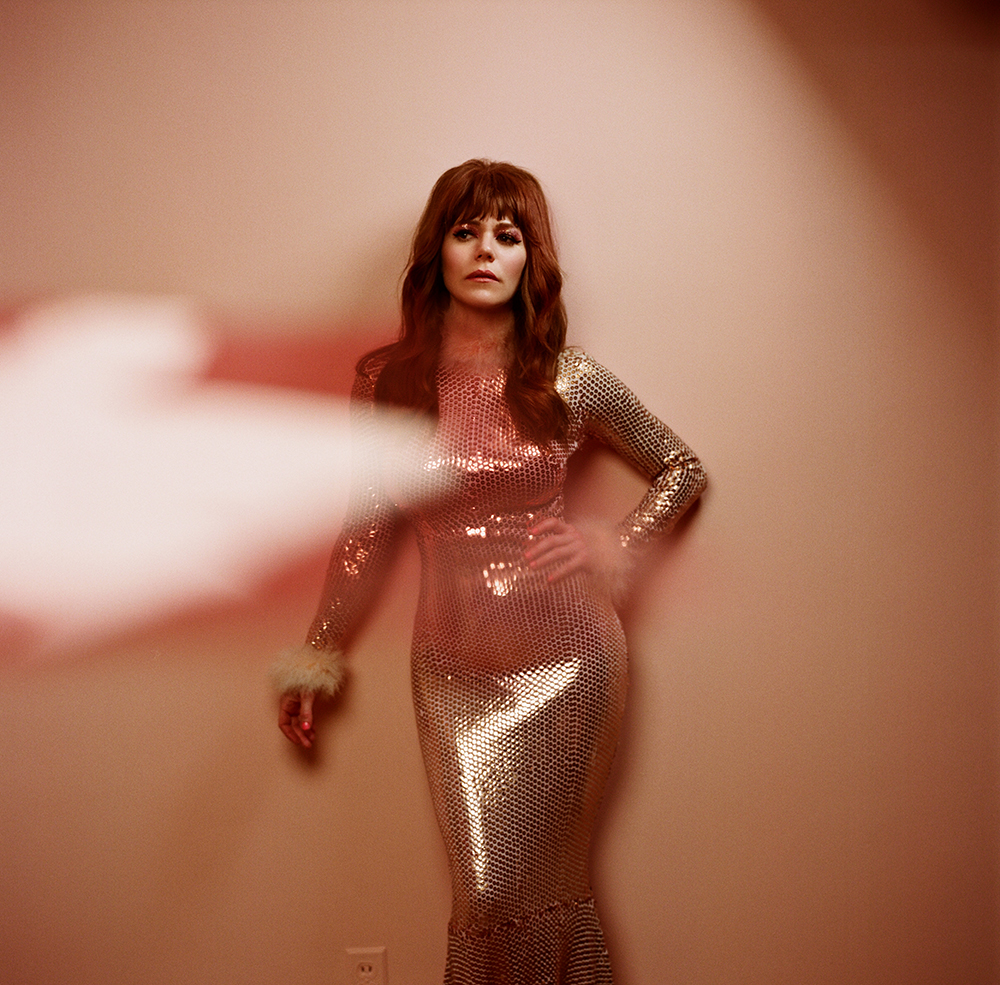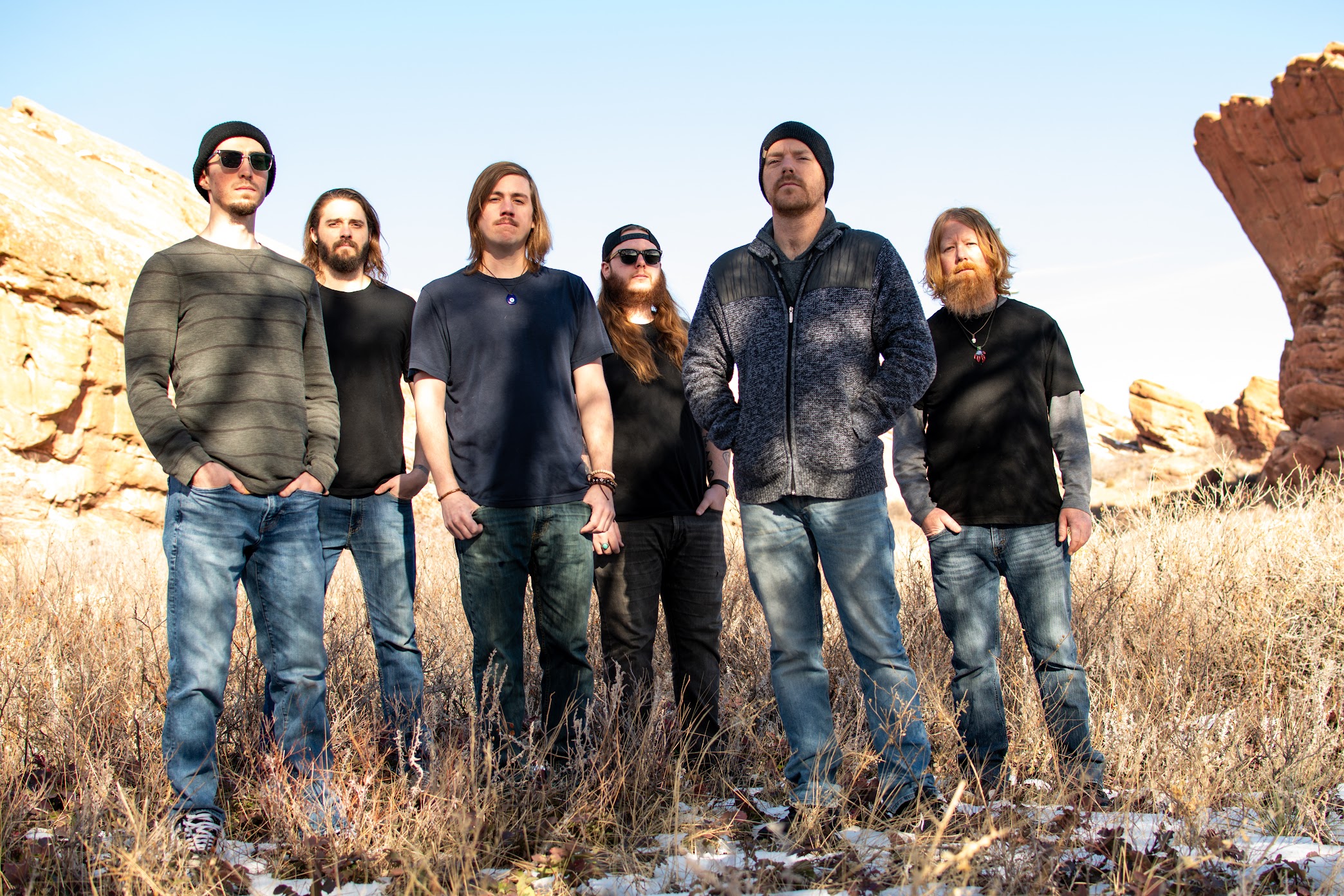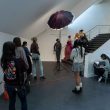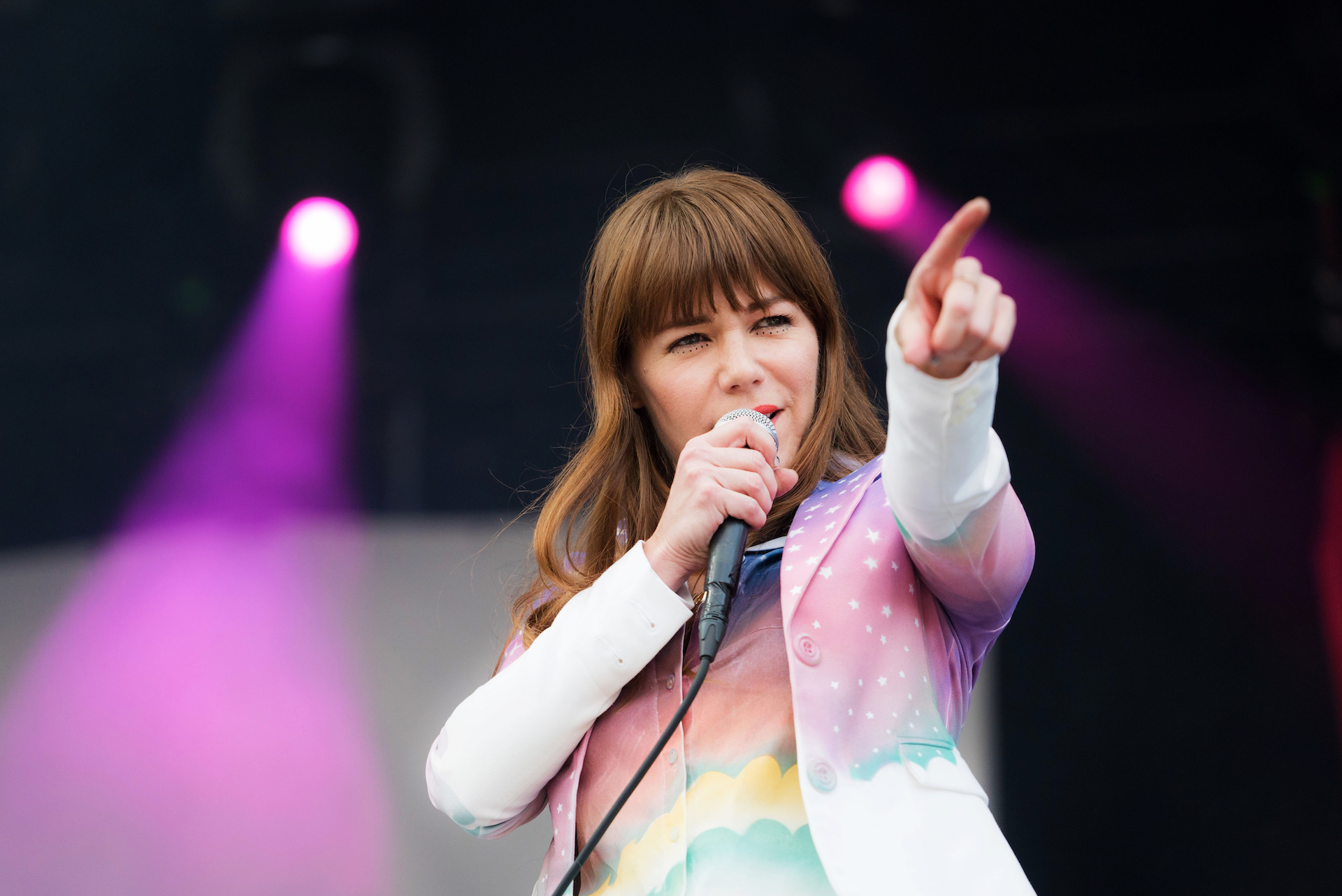Jenny Lewis holds a singular place in the world of indie music. As one of the first and most important female voices to emerge from the male-dominated genre of the early aughts, Lewis always carved a path for herself by creating songs through intimate storytelling. However, for a long time, it wasn’t exactly clear whose stories they were or how exactly they connected to Lewis’ real life. Because until recently, Lewis was known for holding back in interviews and often didn’t divulge the meaning of her songs (see 2014 New York Times profile). This was especially true when it came to the complex relationship she had with her parents.
During her earliest years, she grew up on the road, living in and out of hotel rooms, while her parents performed as a “Sonny and Cher-style lounge act” called Love’s Way. Later when her parents split, her dad left and her mother struggled to support the family as a waitress. That burden soon fell to Lewis — who rose to stardom as a child actor and became the family’s financial backbone. It was only after her mother’s death in 2017 that Lewis revealed her mother was struggling as a heroin addict all those years. The most recent album, On The Line, comes to terms with losing her mother as well as the end of her 12-year relationship with her boyfriend Jonathan Rice. We spoke to Lewis about her loss, coming out on the other side of grief and what those song lyrics, finally, really mean.
303: Thank you for taking the time to talk to me. I know your new album On The Line deals with the death of your mother and a serious breakup. I had a similar experience of losing my mom and being with her in the hospital when she passed — so I really appreciated the album.
Jenny Lewis: Well thanks for sharing that with me. Being with someone in that state is so raw and psychedelic and so intimate, isn’t it? I’ve never really gone through that. My dad passed away, but I wasn’t really there for it. So it was just like such a wild human experience, but very spiritual, you know?
303: Absolutely. In your Rolling Stone profile, you talk about how you wrote down the things she would say when she was hallucinating at the hospital. Did any of those things make it directly into the album?
JL: Yeah [in] “Little White Dove” they are very specific moments and then [some are] kind of embellished for the sake of poetry. She really would call me “kitten” and “her majesty.” And these aren’t things that she ever called me in my life. These were new loving nicknames that somehow embodied the spirit of what she couldn’t articulate because she was in so much pain and so medicated. But this was this distilled thing, which I think language is so fascinating when people are passing over into another reality.
303: Yeah that’s definitely a unique time. Your songs are so personal but also feel like a work of fiction. How do you blend the two?
JL: Well, just going back to the reality versus a magical reality. I’m a fan of Mexican filmmaking — Birdman is an example of that — where you’re not sure where you are but there are anchors of reality, but then it allows itself to become magical. In “Little White Dove” with the lyrics “All the guardian angels at the door with their long white coats and their stethoscopes” there’s a magical but realistic element at play there. And so it’s really exciting, just as a writer, to be in it and then kind of remove yourself from it.
303: What’s your writing process like?
JL: I’ve become more open to the note process, where it’s just fluid and constant. So I’m trying to write every day. I’m working on something all the time — a lyric or a melody. The less I try to identify it, the more freely it comes. And that doesn’t mean I don’t do homework because I do. I let it kind of come and then I just chip away at it to create, to tell the story. And some stories are more detailed than others, but I think the devil’s in the details. I want the dirt. I want the minutia … It always starts with a feeling or a melody. But then I feel like it’s my job to present something that has clarity. I was talking to a friend of mine the other night [about] the importance of communication and clarity in communication. We’re texting each other. We don’t know the tone. I think it’s exciting to really create a very distinct thing that you can imagine.
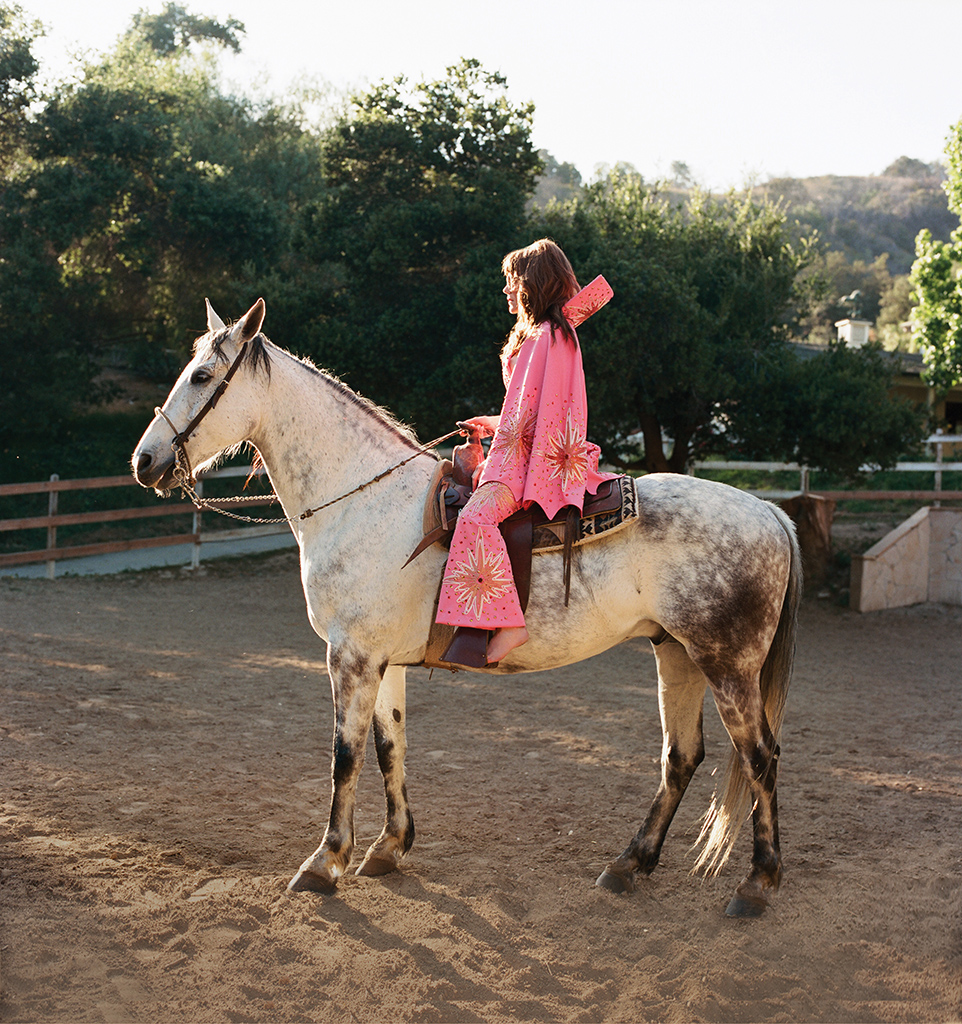
303: I know this album is about grief and a breakup — but it doesn’t always sound that way. Is that just a musical choice or does it connect to that underlying feeling of autonomy and independence that you also say is represented in the album?
JL: It’s all of those things. It’s not one thing. It’s life. It’s work. Life mirrors work, vice versa. I don’t know. But it couldn’t possibly just be a breakup album because you don’t just break up and then nothing else happens. It all happens at once. People love a breakup album and I think it can stand as one but then it is also about a rebound, rebirth and death. Thinking of a breakup as an end is a misstep, for me. It was a beginning.
303: I’m sure you get a lot of people who come up to you and tell you how your songs are so personal to them. That must be its own kind of experience — when something is so highly personal and then all of a sudden it becomes everyone else’s story.
JL: Yeah! And it’s weird cause I don’t see myself in the world like that. I’m just walking through my life and creating from my own love and suffering or whatever. But when people come up to me, I’m always kind of like, “What? Really?” That was my feeling. And now it’s your feeling, too.
303: You’re known for having a great connection with your audience — sometimes it feels like you’re singing to just one person in a room. Is that something you actively try to do? Or is it more accidental?
JL: No. I mean, you catch eyes with someone and it’s accidental in where you stop, but I don’t think any of it is accidental. It’s an exchange of energy when you’re playing a show, creating an experience that people feel. So I’m not looking to check out on stage. I check out enough in my own life, but I want to connect on stage. Some nights I feel shy and to look at someone in the eyes is almost too intimate, so I kind of look over people’s heads. But yeah, I like to connect and I like to really feel what people are experiencing. I don’t mind when people are on their phones experiencing it through their phone. I think it’s really weirdly meta.
303: Yeah, I don’t think a lot of artists make direct eye contact like that because it’s really personal and in some ways a brave thing to do — especially when you’re singing about something that’s so intimate.
JL: Yeah it’s like breaking the fourth wall… That is why [my band] Nice As Fuck played on the floor. We wanted to be on the same level as the listeners because we’re all in it together. I can’t play on the floor; Maybe I could — that would be amazing. Those are the most fun shows I’ve ever played. Just face-to-face with people where I was truly an inch from people’s faces. It was insane. It was almost too much energy. By the end of it, I was like, whoa, that was intense. Because it’s confrontational. I’m like fucking with people a little bit.
303: I’ve read that you like a little confrontation and a little bit of tension when you’re creating music in the studio. Can you elaborate on that a bit?
JL: Well, I don’t think it’s a necessity, but you can get complacent with your body chemistry and get lazy. So running around the building or breathing or doing something that agitates you, I think it kind of heightens your adrenaline for performance. I heard a rumor about The White Stripes that they used to have a rehearsal room backstage and they would play the whole set with each other before going on stage. So they’re out there and they’re warm.
303: What are your rituals before you go on stage?
JL: I’ve been getting my hair and makeup done on my last tour, which is the first time I’ve ever done that. I’ve always done my own makeup, which looks like real makeup. So that has been something that’s so nice. I’ve always been too DIY. Like I can do it myself. I would do my own cat eye, you know? But after having [my makeup artist] do that for me, I was like, I want a fucking cat eye every night. I can go out and be like a superhero. I have my armor so I can go and crush. It sucks when your hair is frizzy and you’ve done your own makeup poorly and you’re standing in front of 500 people. You’re like, god, I wish I had a cat eye.
303: You’ve played all over Colorado. What was your first show like in Denver? Or a memorable one?
JL: Oh Gosh. I can’t remember the first one, but I played in Denver a million times in the tiniest of bars. The tiniest of venues, then Red Rocks opening up for Beck. I will say that every show I played in Denver — including in Colorado like in Telluride, where I can’t fucking breathe — the peeps are there and it’s always been a place where I feel like I connect.
303: At Red Rocks — you sang a cover of “Harvest Moon” under an actual harvest moon with Beck that made national headlines. Did you plan that? Or do you sing that song on every stop?
JL: No, that one was my call because it was a harvest moon and because he likes to do covers. And honestly doing covers is my biggest fear as a musician. I’m so afraid of other people’s songs. I didn’t learn how to play music like that, so every time I tour with Beck I stress out so hard because he’s like, “let’s do a cover.” But it was so fun. And what a beautiful fucking song.
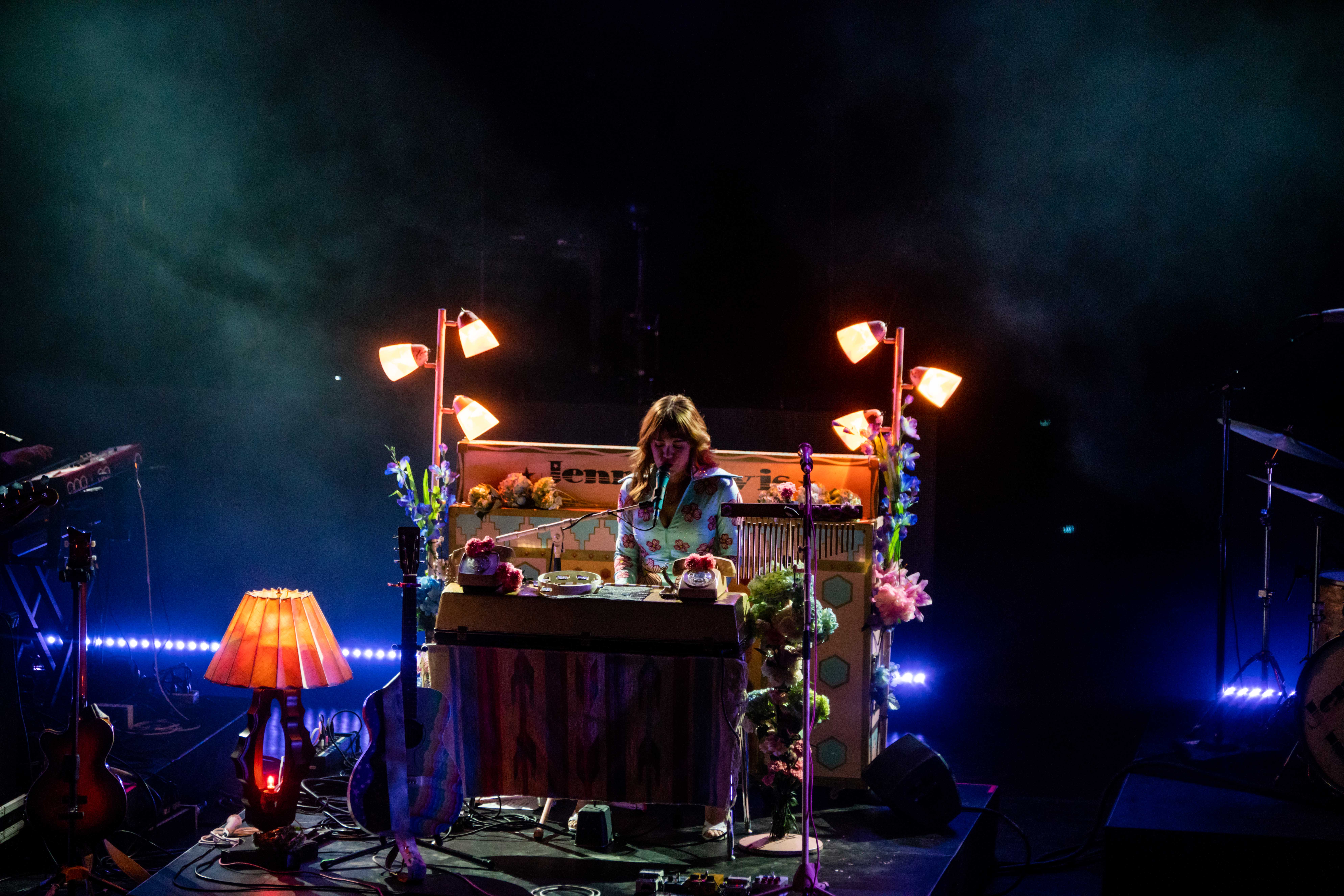
303: That’s interesting because your parent used to do covers in Las Vegas as an act and your sister sings covers at bars. So it runs in your family, correct?
JL: Yes. And maybe that’s why I’ve rebelled against it because I’m a writer and I just have always written songs. I have so much to say, always, that I don’t want to say other people’s [words]. And I know that’s kind of immature and it’s not that I don’t like to do covers I just am a little bit afraid of them. But I also want to play my own songs.
303: And that kind of goes back to the theme of autonomy in your music
JL: I know! And I feel like people give me shit for not wanting to do covers and it’s like, don’t you want me to do something that I enjoy? Is that self-centered, as an artist, to only want to do your fucking songs now? Maybe I am just lazy [sighs]
303: Going back to your current album. I read that you have a ton of landline phones in your house because you don’t get great cell service. It’s also the name and imagery of your album, On The Line so is there any special significance with these phones beyond that?
JL: Well that’s how I communicate. That’s why I had to put you on hold earlier because I am on my [landline]. And “On the line” has so many meanings, but it is a literal thing. When I’m at home I have to talk on the landline. So it all just sort of worked out. I was like, oh, I need phones for my stage show. And I looked around my house, I was like, great, I already have 12 old school phones so it all kind of just came together naturally.
303: How do you come about finding the phones?
JL: I thrift, eBay them and “antique-mall” them. I go to every antique mall in every town and I’m always on the lookout. I’m like a collector of weird and shit.
303: Is there any like particular landline that is really special to you?
JL: Well they’re now on the stage. The neon light up phones, those are my faves. There’s two on my piano and one on this little heart riser that I stand on. And it actually accepts phone calls! You can call me from the monitor desk. So I played a show and Britt Daniel from Spoon called me from the side. I was like, “Oh my god! Britt do you want to come up and sing a song?”
303: Do you think you’ll ever accept any other phone calls from the stage?
JL: Yes, I was supposed to accept one in Charleston from Bill Murray, but we ran out of time. It was my biggest regret of our last tour. I was like, “fuck!” But hopefully, he’ll call some other time.
303: Talking about your album cover and design, it’s interesting that for the last two you don’t show your face. Is there a reason behind that?
JL: Going back to the superhero costume. I feel like that cover is really designed so you can put your head on a different body. It’s like a paper doll. And so it’s just a series of outfits that embody a period of time and a feeling. I get dressed every day and I’m like, how do I feel? What color do I feel today? How do I want to present myself to the world? It’s like very important to me. Presentation. So On The Line is a continuation of The Voyager and those are bookends. You know, two chapters. So we’ll see what happens for the next one.
303: Your album cover for On the Line also ended up being a type of homage to your mom because she wore the same kind of outfits when she was singing in Vegas and has an identical mole on her chest. But that was completely accidental, right?
JL: Yeah! Can you believe? It found me. I didn’t find it. It came to me and it’s really beautiful. It’s weird. I think overthinking can kind of stifle you. It’s pretty obvious to me when it is the cover, I’m like, oh, there it is. I see it. It’s the only cover. There are no other options.
303: And only later you realized it had all this hidden meaning
JL: Totally. And that’s life, too. There’s so much subtext. There are subtweets. I love subtweeting.
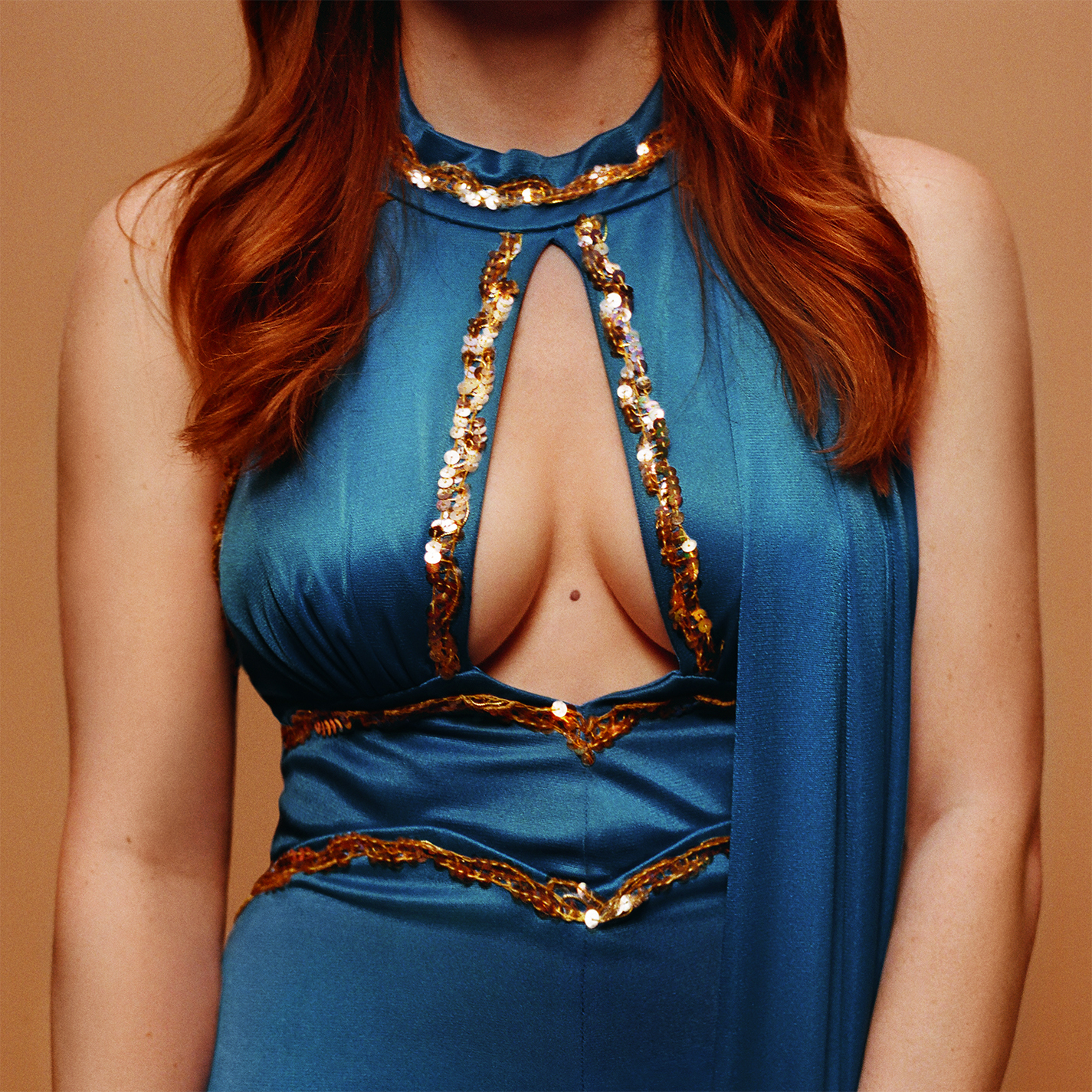
303: Who are you subtweeting right now? Or what’s your favorite subtext subtweet?
JL: Well like a romantic outreach, but in like a weird way, you know? It’s totally directed at one person and only you and your girlfriends know and your girlfriends will call you out on and they’re like, “who’s that for?” It’s like, “get out of here!” Mind your own beeswax.
303: The cover and colors of the album also have a special meaning because when you were making the transition from your breakup, you painted your house a special pink and it seems that pink has made its way into the album along with a certain blue. Tell me a little bit more about the significance of color on this album. What does it mean to you lately?
JL: Color blocking is very important to me before an album cycle and always has been back to The Execution Of All Things. I remember I was like, peach is the color and everyone was like, “Peach? We’re not wearing peach.” So I was like, “Okay I’ll wear peach then.” So it helps me focus. It just simplifies it. And I think there’s so much power with color. You don’t have to stay a lot. Just one color can be so much. So The Voyager was every color, the rainbow.
But again, pink and blue — so these are the colors we picked. I was talking to a friend of mine yesterday and she was saying her kid goes to a school that’s really advanced and gender neutral and a very cool charter school and the kids aren’t allowed to wear pink or blue. And I was like, oh my god, that’s my colors! But it’s gender neutral because it’s both but when I sing “Just One of The Guys” every night [with the lyrics] “I’m just another lady without a baby” I realized it’s like a fucking baby shower. I’m like throwing a baby shower every night and then I play that song [laughs]. So color has mood, color expresses. Also, a solid color looks really great when you’re being photographed by the crowd every night — which I love sourcing the photos that people take.
303: What’s your favorite color then?
JL: Peach [laughs]
303: Why peach?
JL: I don’t know. I’ve always loved peach for some reason because I’m kind of like a peach. That’s my spirit fruit. I’m like a squirrel and a peach in a Honda Accord.
303: [laughs] That is great.
Jenny Lewis plays the Ogden Theatre on Thursday, May 16. Tickets are available via Axs.
